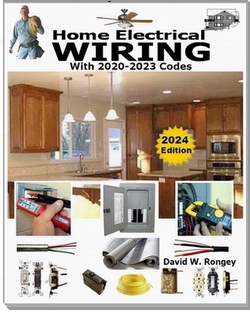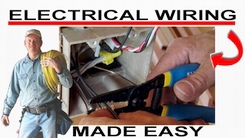» Need Electrical Help? Ask the Electrician
Electrical Codes for Basement Wiring
 |
By Dave Rongey
Summary: Electrical Wiring Question: Hi there: When installing electrical circuit wiring in a basement that will be wired through the ceiling to a first floor outlet near the floor of that level, is Romex wire OK? We have heard that you should use metal cable. © By: Dave Rongey |
Electrical Codes for Basement Wiring
Electrical Troubleshooting Question:
When installing electrical circuit wiring in a basement that will be wired through the ceiling to a first floor outlet near the floor of that level, is Romex wire OK? We have heard that you should use metal cable.
Thanks! Randy M.
Hi Randy - Great Electrical Repair Question!
Here are the electrical codes for Basement Wiring:
Basement Wiring - NEC Sections 336-6c, 333-11.
The concern is that the wiring is protected and not exposed to physical harm. Other considerations include the future use of the area.
You do not want to run surface wiring if the area may be finished off with sheet rock or other materials in the future.
Romex-Type-NM Cable
The code states that the Romex style wiring made up of two conductors smaller than No.6, or three No.8 must be run through holes bored in joists, or on running boards which would provide protection to the wiring.
Armored BX Cable
In unfinished basements, exposed runs of armored (BX) cable can be run on the undersides of joists in basements where supported on each joist and so located as not to be subject to physical damage.
Unfinished Basements
In Unfinished Basements where the cable is run at angles with joists in unfinished basements, it is permissible to secure cables not smaller than two No. 6 or three No. 8 conductors directly to the lower edges of the joists.
Smaller Romex type cables shall either be run through bored holes in joists or on running boards. On Running Boards refers to wood members such as joists, girders or supporting members. This accomplished by following these members there by having a means for protection and anchoring.
From: Randy M.
Dave, thank you very much for the info!
Regards,
Randy M.
PLEASE NOTE: The local inspection authority usually interprets the meaning of subject to physical damage. Your local building inspector enforces their Interpretation of the Code , thereby having the final authority.
Be Careful and Be Safe - NEVER work on a Live Circuit!













